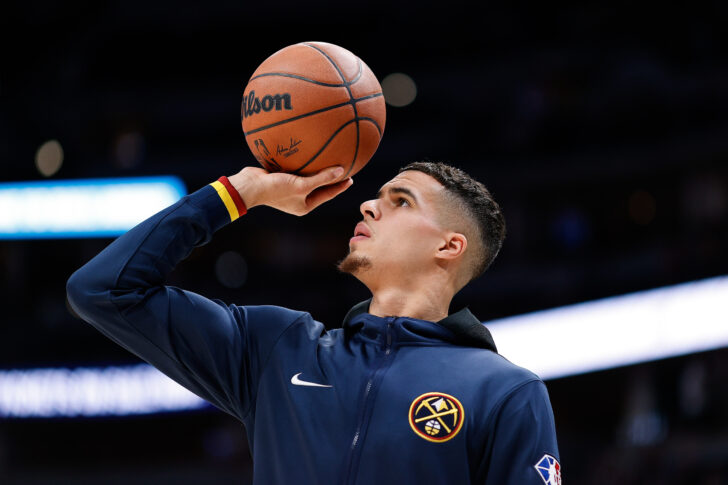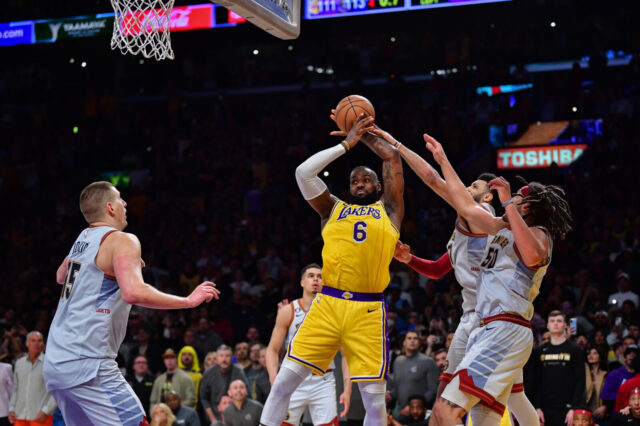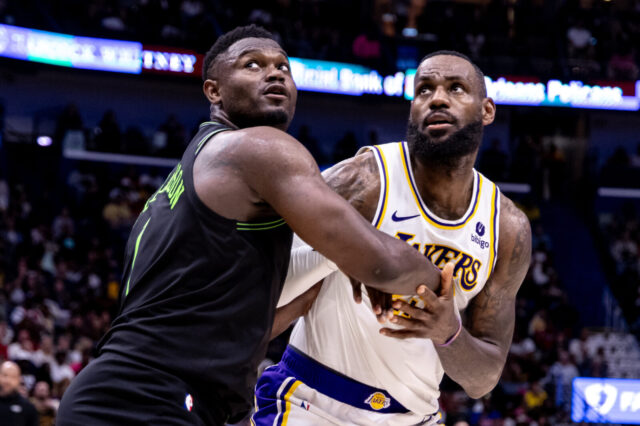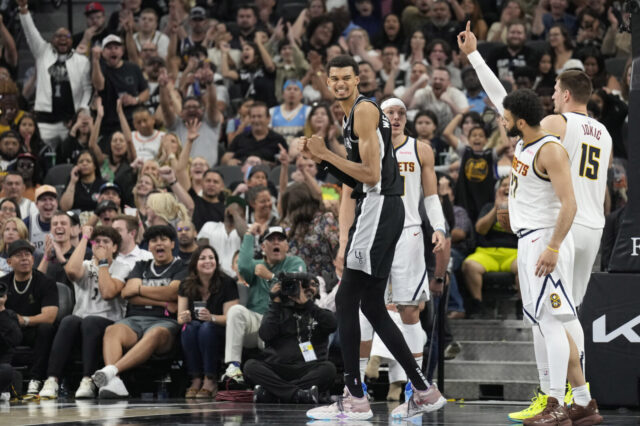Today marks 47 days until the beginning of the 2022-23 NBA season. In preparation for the most anticipated year in Denver Nuggets franchise history, Ryan Blackburn is asking and answering 20 burning questions facing the Nuggets prior to Media Day on Monday, September 26th. One question each weekday for the next four weeks.
Question 4: Can Michael Porter Jr. stay healthy for the entire season?
The Denver Nuggets lost out on more than just a championship run last season due to the injury bug.
With Jamal Murray known to be sidelined for an extended period of time, the Nuggets knew they had to adapt. Monte Morris would be the starting point guard in his place, but the Nuggets knew they had to replace Murray’s scoring and playmaking with more than just Morris. Nikola Jokić would be the lead scorer and playmaker, but it was Michael Porter Jr. who would take up the opportunity to be Denver’s second option every night. After scoring 19.0 points per game during the 2020-21 season as primarily a third option, Porter was in line for a major statistical breakout, one that could keep Denver in the contention window until Murray returned.
It didn’t work out that way.
Porter struggled mightily at the beginning of the 2021-22 season, more than he ever had before in his NBA career. In the ninth game of the year against the Houston Rockets, Porter went up for a transition dunk and flat-tired, coming up gimpy after his leap and clearly showing some discomfort. After several days wait, it became clear that Porter would be out for an extended period of time, having re-aggravated his back injury that was already giving him trouble during the preseason.
Porter had surgery to relieve pressure on a vertebrae in his lumbar spine. After the surgery, Porter immediately felt relief on the area, but the Nuggets were playing things cautiously. Porter worked hard to get back on the court later in the season, but after suffering a small setback in March, the Nuggets decided to shut him down entirely.
The nine games to start the season, roughly 33 quarters of action and just 265 total minutes, were all MPJ had to truly navigate his new role and develop as a second option. If Porter had stayed healthy, who knows what Denver’s season would have been like? Who knows how Porter would have performed? Before the season, Nuggets fans were hoping to see Porter take the leap, replicating the numbers he produced in the wake of Murray’s injury.
In the 17 games Porter played after Murray went down against the Warriors on April 12th, Porter averaged 33.4 minutes, 23.5 points, 6.1 rebounds, and 1.5 assists per game, shooting 56.0% from the field and 48.9% from three-point range. Those numbers are patently absurd, especially the shooting efficiency. His true shooting during that stretch was 70.2%, even though he averaged nearly eight threes attempted per game. Nobody in NBA history has ever done that for a full season.
Perhaps it will never happen again. Perhaps that was simply lightning in a bottle at the end of a regular season. It certainly didn’t feel like a flash in a pan at the time, though another lost season changes the perspective a bit.
Those numbers though? They represent a brief glimpse at Porter’s ceiling. The Nuggets used Porter as a supercharged version of Duncan Robinson on the perimeter, running him off of screens, giving him as many opportunities for open shots as possible. Porter thrived, and though he still has other parts of his game that need to improve, they will mature with time. He will become a better passer, a better defender, a smarter player, through repetition and commitment to his craft. There’s no reason why that can’t happen if Porter plays another 200 games. He will be meaningfully better at that point.
The biggest question for Porter isn’t the talent, but rather how many games he can play.
In terms of major injuries, back issues in the NBA are fairly uncommon. Larry Bird notably had back issues in his thirties. Tracy McGrady had back injuries while on the Houston Rockets. There aren’t very many approximations for 24-year-olds with three back surgeries already on their resumes though.
Porter is clearly a unique case, and unlike Murray, whose ACL tear rehab has a fairly linear track to health, Porter’s issues are far more ambiguous. He missed the bulk of his one college season in 2017-18 and his first professional season in 2018-19. Then, he had no injury issues in 2019-20 as primarily a reserve, playing 55 out of 73 games and averaging 16.4 minutes per game. Of the 18 games he missed, five were due to an ankle sprain, one was due to back soreness, and the other 12 were DNP-CD’s. In 2020-21, Porter played 61 out of 72 games the following year, missing 10 of the 11 due to health and safety protocols and the final game due to rest at the end of the season.
So, Porter has seen entire seasons ripped away from him. He’s also played relatively healthy seasons as well. It’s hard to know which end of the spectrum we will get this season, but apparently, he and Murray are fully healthy at this stage and will enter training camp ready to go.
Like Murray, the Nuggets will be cautious with Porter throughout the 2022-23 season. No plan for rest and injury management has been set quite yet, but expect Porter, Michael Malone, and the Nuggets training staff to get together and figure out a plan that makes sense for everybody.
The Nuggets need Porter on the court to become the best version of themselves. They won’t figure out how to best approach high pressure situations unless they know what exactly Porter can and can’t do. There will be a trial period for the first couple months of the season. The better Porter handles these moments physically, the more the Nuggets will be able to trust him when the playoffs come around. If Porter can’t stay on the court, it will be that much more difficult to incorporate him into the flow of the offense and defense.
Porter will most likely be Denver’s starting small forward to open the season. How many games he plays and how often he suits up for back-to-backs is to be determined. Most likely, Porter is in line for playing about 60 to 65 games this year, roughly 75% of the regular season. His role will be determined based on how well he handles the minutes. Jokić will be the first option and Murray will most likely be the second option. Porter will find his opportunities around those primary actions, but Denver will call plays for Porter too. They have to. He’s too talented to not take advantage of advanced shotmaking capability.
Could Porter’s playing tendencies change heading into next year? The 6’10” forward is a physical rebounder, especially on the offensive end. Will he be just as willing to initiate contact going forward? Perhaps. Perhaps not. Porter has also struggled with mobility and agility on the defensive end of the floor, though he looked better at the beginning of last season before the injuries sidelined him completely.
Like I stated above, some of Porter’s issues will be solved (or at least mitigated) with additional experience. He needs to play to get better, plain and simple. The more experienced he gets, the better he will be able to take advantage of his physical tools on both ends of the floor. For example, there were 18 total forwards that matched Porter’s steal rate and block rate during the 2020-21 season. None of those players were ever really considered defensive liabilities during the primes of their careers. Why can’t Porter improve on that end of the floor as he gets older and smarter?
In the end though, offense will be Porter’s trump card. It served the Nuggets well during the 2020-21 season. When Porter, Jokić, and Murray were all on the floor, the Nuggets scored an absurd 127.1 points per 100 possessions in nearly 800 minutes, according to PBP Stats. The Nuggets still have the ability to outgun teams when their stars are on the floor in almost any circumstance. There may not be a team in the NBA today that can credibly slow down the Nuggets offense. Perhaps the Boston Celtics with their host of defensive talent, but that’s a problem for the NBA Finals.
If Porter manages to stay healthy for the entire season, there’s no telling what he and the Nuggets can do. The ceiling remains high for Porter, despite the red flags. He’s an elite shooter, strong rebounder, and is developing as an all-around scorer. There’s a world where he averages 25 points per game in a playoff series to lift the Nuggets over a fearsome Western Conference opponent. Because of that, the Nuggets must remain patient and play the long game with him.
Because if Porter is still around by the end of the playoffs in June, the Nuggets will be there too.




